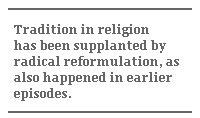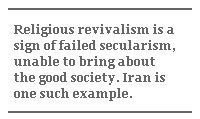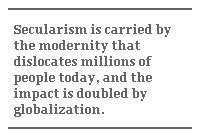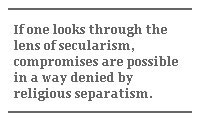Globalization and God – Part II
Globalization and God – Part II

CAMBRIDGE: In our increasingly globalized world, a commonly held view, to be found in newspaper headlines, magazine stories and TV images of religiously inspired violence, is that “God is winning.” Secularism, on this account, has run its course. What is called “prophetic politics,” it is argued, is a better guide to the present and the future.
I wish to argue in opposition that the religious resurgence is getting disproportionate attention, as the media distorts the reality in which secularism – defined as an indifference to or rejection of religious belief and ritual – has been steadily gaining ground.

A longer-term and more extensive view suggests that present-day displays of religious fervor are a result of the successful process of secularism, not a sign of its decline. What we are witnessing is the rearguard reaction to the threat of modernity and globalization. It is the position of people who feel they are losing the fight and, in desperation, are returning to “traditional” belief – only in this case, tradition in religion has been supplanted by radical reformulation, as also happened in earlier episodes.
What is the evidence for surging secularism over the long term? China, where one fifth of the world’s population exists, is not undergoing a religious revival (the Falun Gong movement is, in fact, not very successful there); nationalism in a Communist dress seems to fill the needs of the authorities as well as the majority of the population. Russia, though witnessing a religious revival, is basically not a religious society. The same could be said for Japan, though for utterly different reasons (and setting aside Shintoism, a “secular” faith). So, too, Europe, home to another one half billion of the world’s peoples, has become increasingly secular, despite occasional flares of the religious spirit. The most recent tribute to the forces of secularism, lost in the uproar over Pope Benedict’s short remark about Islam, is his admission that the Catholic Church’s real enemy in the West is an increasingly secularized society. Thus it is the Middle East, Africa, and the Moslem and Christian faiths to be found there, that are mainly at issue. The US is a special case; a secular society, marked by religious elements fighting a rearguard battle to retain their slipping dominance,.

In fact, religion is really religiosity, i.e., excessive ritualistic expression of sentiment, on one side and substitute nationalism on the other. It is the transmutation of religion into politics that is key. We witness not a search for spirituality or even for a more peaceful world. Instead, religiosity is to be found mainly in aspiring states, where authoritarian leaders offer neither stability nor economic development. In short, religious revivalism is a sign of failed secularism, unable to bring about the good society. Iran is one such example and post-Soviet Russia another pale version of what is happening.
Secularism, however, is growing even in areas claimed for the revival of religion. Secularism seeps into all cultures by a thousand openings. It comes through computers and videos, through globalization whereby the hedonism of the West is conveyed. Whatever the mullahs or preachers say, their flock is exposed to worldly images and these stir up righteous indignation. Yet the promoters of religion resort to the same tools of globalization to spread their own messages: cell phones, computer messages, TV and so forth. The cry of the muezzin is no longer only intoned from the tower but from the satellite dish as well. At what point does the medium become the message?

There is nothing totally new in the combination of religion and politics; it is their renewed strength and their globalized aspect that allows some to say that God is winning. As remarked, the turn to religion is a natural reaction in a time of troubles, increased fear and enormous anxiety. What exacerbates the present situation is that the stable structures of life and governing power have visibly broken down in many quarters of the globe. Add to this that politicians and leaders, or would-be leaders, opportunistically stoke the fires of fear. The smoke from these flames obscures the deeper trends of our times.
In fact, to use religious language, God moves in mysterious ways. For example, we can discern, if dimly, the tentative rise of questioning in Islamic religion itself. We need to recall that Christianity in Europe went through similar turmoil in the 19th century. Embraced by reactionary monarchs – not mullahs in this case – Christian belief was gradually attacked in the theological schools. Both Hegel and Feuerbach started their studies there. The Young Hegelians were believers who began to question their faith on the grounds of reason. It was from inside, as much as from the secularizing forces of the modern state, that Christianity began to be hollowed out. Something similar can be glimpsed as happening in the theological academies of the Islamic world. Even in the theocracies of Iran and Saudi Arabia, public life – with ordinary “citizens” pushing the bounds of what is permissible – is escaping bit by bit from the control of the mullahs.
It is all a slow, two-steps forward, one-step backward process. Secularism is carried by the modernity that uproots and dislocates millions of people today, and the impact is doubled by globalization. The US itself is not immune from the forces at work here. Feeling constantly besieged by the powers of reason and science, made anxious by the threat of terrorism, drawing on almost three centuries of religious fundamentalism, many priests and preachers of the religious word feel threatened that their positions as authority figures are being usurped by other voices. Education seems slipping from their grasp.

We need to step back from the immediacy of the historical moment, and remind ourselves of the underlying forces at work in our increasingly globalized world, making for increased interconnectivity and interdependence, based on expanding ties of trade and media exchange. Much time-space compression is one result. Science and technology, and the exercise of rationality on which they are based, loom ever larger for good or evil. It should hardly be surprising that, in the face of the long-term processes leading to a more secular world, many should seek comfort in what they see as the winning team of God. Theirs, however, is a short- run triumph in the places where it occurs, acting as a momentary, though enormously important, hiatus in the steady though erratic movement to the everyday reality of secularism.
Policy based on incomplete understanding leads to poor decisions. It causes us to overlook the political aims behind the religious rhetoric; to see a “conflict of civilizations,” with civilization being reduced to religious affiliation instead of the nationalist and regional rivalries for power that it embodies. If one looks through the lens of secularism, negotiations and compromises are possible in a way denied by religious separatism. When God is seen as winning, Humanity loses. This statement does not deny the importance of religion. It simply puts it in the proper context, where, masquerading its true political intent, religion battles against a surging secularism.
Bruce Mazlish is professor of history emeritus at Massachusetts Institute of Technology and the author of “The New Global History” (Routledge, 2006).